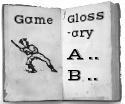Ball Stand: Difference between revisions
Jump to navigation
Jump to search
(Glossary import) |
(Set Game Eras to Derivative) |
||
| (2 intermediate revisions by the same user not shown) | |||
| Line 2: | Line 2: | ||
|Term=Ball Stand | |Term=Ball Stand | ||
|Game Family=Hook-em-snivy | |Game Family=Hook-em-snivy | ||
|Description=Elmore (1922) | |Description=<p>Elmore (1922) describes this as a game of attrition for ages 8-12 that involves throwing a ball against a wall. One player is named to catch it. If the player does, “stand” is shouted, and other players are to freeze in their places. If the player with the ball can plug someone, that player is out; if not, the thrower is out. This game has not batting or baserunning.</p> | ||
|Sources=<p><span>Emily W. Elmore, </span><em>A Practical Handbook of Games</em><span>, (Macmillan, NY, 1922), pages 16-17.</span></p> | |||
|Game Eras=Derivative | |||
}} | }} | ||
Latest revision as of 09:44, 28 November 2012
| Game | Ball Stand |
|---|---|
| Game Family | Hook-em-snivy |
| Location | |
| Regions | |
| Eras | Derivative |
| Invented | |
| Tags | |
| Description | Elmore (1922) describes this as a game of attrition for ages 8-12 that involves throwing a ball against a wall. One player is named to catch it. If the player does, “stand” is shouted, and other players are to freeze in their places. If the player with the ball can plug someone, that player is out; if not, the thrower is out. This game has not batting or baserunning. |
| Sources | Emily W. Elmore, A Practical Handbook of Games, (Macmillan, NY, 1922), pages 16-17. |
| Source Image | [[Image:|left|thumb]] |
| Comment | Edit with form to add a comment |
| Query | Edit with form to add a query |
| Has Supplemental Text |
Comments
<comments voting="Plus" />
